- Home
- Muriel Spark
The Golden Fleece: Essays Page 5
The Golden Fleece: Essays Read online
Page 5
And here is my point of view:
Literature, of all the arts, is the most penetrable into the human life of the world, for the simple reason that words are our common currency. We don’t instinctively, from morning to night, paint pictures to each other, or play music to each other, in order to communicate; we talk, we write to each other.
And so, when I speak of the desegregation of art I begin with the art of letters. But I mean also the other arts, drama, music, painting – to-day, more than ever in process of abstracting themselves from the confines of separate faculties, already tending to become part and parcel of society, where they belong. We are living in times when there are fewer great artists, fewer great writers, but more and better art, better and more lively and a greater volume of writing. It is easy to say that poetry and the novel are on the decline compared with the great masterpieces of the past. But it seems to me that the art of speech itself has improved, standards of journalism and reportage have improved, speech has become sharper and more ready on everyone’s tongue. We express ourselves more freely and with less clutter than ever before. It’s true that in some parts of the world people are not permitted to say what they think; but even so, no-one can deny that they are very eloquent and very occupied to say what perhaps they don’t exactly think. In Italy, where I live, when the millions of Americans flood in to enliven the summer months, we find them ready and able and eager to discuss everything and anything. And we ask ourselves where this great silent majority is that we hear about. Those quiet Americans certainly don’t come to visit us.
Now leaving aside the other arts for the moment, I concentrate on the art of literature for the very reason that a distinction has to be made between the verbal communications going on every day, every moment of the day, and what we call literature.
I think that the art of literature is a personal expression of ideas which come to influence the minds of people even at second, third and fourth hand. Literature infiltrates and should fertilise our minds. It is not a special department set aside for the entertainment and delight of the sophisticated minority. And if this is true, then ineffective literature must go.
We all know that there is a lot of inferior literature about as there are inferior and boring examples of any other art. It is easy to say bad things must go. The critics, in every field of art, are never done denouncing what they feel to be bad art. They rightly prune and cultivate, they attempt to practise good husbandry. And as we become more articulate, itinerant, knowledgeable, we are more and more agreed on what is bad. And everyone knows we have to give up what is bad – it is a banal moral precept. What is wrong, what is bad, must go.
But I suggest now that we have to give up some of the good manifestations of art. Good things, when they begin no longer to apply, also must go. They must go before they turn bad on us. There is no more beautiful action than the sacrifice of good things at the intelligent season and by intelligent methods.
I’m sure you would like me to be more specific. And so I will be.
We have in this century a marvellous tradition of socially conscious art. And especially now in the arts of drama and the novel we see and hear everywhere the representation of the victim against the oppressor, we have a literature and an artistic culture, one might almost say a civilisation, of depicted suffering, whether in social life or in family life. We have representations of the victim-oppressor complex, for instance, in the dramatic portrayal of the gross racial injustices of our world, or in the exposure of the tyrannies of family life on the individual. As art this can be badly done, it can be brilliantly done. But I am going to suggest that it isn’t achieving its end or illuminating our lives any more, and that a more effective technique can and should be cultivated. And then I shall offer my own idea of precisely what that method might be.
For what happens when, for example, the sympathies and the indignation of a modern audience are aroused by a play or a novel of the kind to which I have referred? I don’t know for certain, but I suspect that a great number of the audience or of the readers feel that their moral responsibilities are sufficiently fulfilled by the emotions they have been induced to feel. A man may go to bed feeling less guilty after seeing such a play. He has undergone the experience of pity for the underdog. Salt tears have gone bowling down his cheeks. He has had a good dinner. He is absolved, he sleeps well. He rises refreshed, more determined than ever to be the overdog. And there is always, too, the man who finds the heroic role of the victim so appealing that he’ll never depart from it. I suggest that wherever there is a cult of the victim, such being human nature, there will be an obliging cult of twenty equivalent victimisers.
I’m sure you all remember the silly old saying ‘The pen is mightier than the sword’. Perhaps when swords were the weapons in current use, there was some point in the proverb. Anyway, in our time, the least of our problems is swords.
But the power and influence of the creative arts is not to be belittled. I only say that the art and literature of sentiment and emotion, however beautiful in itself, however stirring in its depiction of actuality, has to go. It cheats us into a sense of involvement with life and society, but in reality it is a segregated activity. In its place I advocate the arts of satire and of ridicule. And I see no other living art form for the future.
Ridicule is the only honourable weapon we have left.
We have all seen on the television those documentaries of the ’thirties and of the second World War, where Hitler and his goose-stepping troops advance in their course of liberating, as they called it, some city, some country or other; we have seen the strutting and posturing of Mussolini. It looks like something out of comic opera to us. If the massed populations of those times and in those countries had been moved to break up into helpless laughter at the sight, those tyrants wouldn’t have had a chance. And I say we should all be conditioned and educated to regard violence in any form as something to be ruthlessly mocked.
If someone derides me, I don’t like it. But at least I can begin to understand the mentality of the mocker. And I can mock back in such a way that he might understand mine. And so there may be room for a mutual understanding. But if he slides a knife between my ribs I’m unlikely to understand anything at all any more.
I would like to see in all forms of art and letters, ranging from the most sophisticated and high achievements to the placards that the students carry about the street, a less impulsive generosity, a less indignant representation of social injustice, and a more deliberate cunning, a more derisive undermining of what is wrong. I would like to see less emotion and more intelligence in these efforts to impress our minds and hearts.
Crude invective can rouse us for a time, and perhaps only end in physical violence. Solemn appeals to our sentiments of indignation and pity are likely to succeed only for the duration of the show, of the demonstration, or the prayer meeting, or the hours of reading. Then the mood passes, it goes to the four winds and love’s labour’s lost. But the art of ridicule, if it is on the mark – and if it is not true on the mark it is not art at all – can penetrate to the marrow. It can leave a salutary scar. It is unnerving. It can paralyse its object.
Does this sound as if I thought of the purpose of art as propaganda? Perhaps it does sound so, and perhaps I partly do. In a sense all art is propaganda since it propagates a point of view and provokes a response. But that isn’t entirely my meaning.
I have often been asked to give an opinion as to what is the purpose of art. And I’ve thought of it a great deal. I’ve thought of this question for most of my life. And, so far, I’ve reached a generalised conclusion that the purpose of art is to give pleasure. Whether the form of art is tragic, comic, dramatic, lyrical, ironic, aggressive, it contains that element of pleasure which restores the proportions of the human spirit, opens windows in the mind. By means of art and literature our wits are sharpened, our intellect is refined, we can learn to know ourselves, how to appraise life with that pleasure which is the opposite and the e
nemy of boredom and of pain.
This is what I mean by canvassing as I do the idea that the only effective art of our particular time is the satirical, the harsh and witty, the ironic and derisive. Because we have come to a moment in history when we are surrounded on all sides and oppressed by the absurd. And I think that even the simplest, the least sophisticated and uneducated mind is aware of this fact. I should think there is hardly an illiterate peasant in the world who doesn’t know it. The art of ridicule is an art that everyone can share in some degree, given the world that we have.
The cult of the victim is the cult of pathos, not tragedy. The art of pathos is pathetic, simply; and it has reached a point of exhaustion, a point where not the subject-matter but the art-form itself is crying to heaven for vengeance. The art of protest, the art which condemns violence and suffering by pathetic depiction is becoming a cult separated from the actions of our life. Our noble aspirations, our sympathies, our elevated feelings should not be inspired merely by visits to an art gallery, a theatre, or by reading a book, but rather the rhetoric of our times should persuade us to contemplate the ridiculous nature of the reality before us, and teach us to mock it. We should know ourselves better by now than to be under the illusion that we are all essentially aspiring, affectionate and loving creatures. We do have these qualities, but we are aggressive, too.
And so when I speak of the desegregation of art I mean by this the liberation of our minds from the comfortable cells of lofty sentiment in which they are confined and never really satisfied.
To bring about a mental environment of honesty and self-knowledge, a sense of the absurd and a general looking-lively to defend ourselves from the ridiculous oppressions of our time, and above all to entertain us in the process, has become the special calling of arts and of letters.
Ladies and Gentlemen of the Academy of Arts and Letters, you have been good to ask me here and to listen to my point of view, as I am, an artist, a sort of writing animal.
[1970]
The Wisdom of Mr T.S. Eliot
For the past few weeks, since The Confidential Clerk was first performed at the Edinburgh Festival, the daily Press has plugged the line that T.S. Eliot’s new play, unlike the rest of his work, is not to be probed into for meaning; critics are to understand that this is witty West End entertainment, no mysteries. We are to treat it light and gay, or we shall make fools of ourselves.
We shall do that in any case (see Wisdom ix.14). I saw the play and found it meaningful. It has to do with faithfulness and idolatry, security and rootlessness, vague desires and precise fulfilments, parents and children, art and craft, success and failure. These themes increase the entertainment qualities of the play, they add to the gaiety and the pathos, and intensify the wit and propriety of the dialogue in all moods. There seems to be no reason why the most obvious serious themes in the play should not be discussed.
I will not tell you much about the plot; it is Greek in type, employing the principle of peripeteia or the reversal of circumstances; and this might be spoiled in the telling, for future audiences. But I will tell you what I can of the main themes, as I understood them, and this means, something about the characters, too.
The play has a talented cast. It is a Christian play; it contains Christian teaching and elaborates Christian ideas, some of which are to be found in the Book of Wisdom. Mr Eliot reaches a point in his dramatic enterprise, at which he conceives all his characters in the light of sympathy and compassion; these are lacking in his past dramatic work.
***
I would like to call The Confidential Clerk a Catholic play, meaning that it presents situations which are wholly true, and they are everywhere and always true. In his new sympathetic treatment of a character like Sir Claude Mulhammer (played by Paul Rogers), Eliot has had to risk blinding the audience to his fearful moral flaw. But this is progressively suggested, and in the last act, our pity undiminished, his life is forced upon us as the life of one, like the potter in Wisdom, whose ‘heart is ashes’.
Mulhammer had wanted to be a potter in his youth; he had entered the city in reluctant obedience to his father. Now he is the merely successful surviving son of a wiser financier, persuaded that he had done the right thing, on the grounds that he would never have been a successful potter. He keeps a roomful of pottery for his secret aesthetic appreciation, or, as we might say, worship. He is in Chapter xv of Wisdom, but this is no guarantee that the author got him from that source.
However, Mulhammer is there all right. He has a supposed illegitimate son, Colby Simpkins (played by Denholm Elliott), for whom his love takes the form of persuading him to follow his footsteps. Colby had wanted to be a church organist, a successful one. Was he justified in abandoning his art to become his father’s confidential clerk, on the grounds that he could have been only a minor artist? Colby is not sure, at first. The father gives him a sumptuous piano, a sort of counterpart to his own roomful of unserviceable clay.
***
This is a play in which everyone’s longings are fulfilled, as the prayers of faithful people are answered, in a way in which they would never have had the courage to foresee.
The author appoints his characters to this end. Colby’s supposed sister, Lucasta Angel (played by Margaret Leighton), ‘who is rather flighty’, and whose wings are desperately invisible, tenders, unaware, to their destinies, and herself emerges from darkness.
Eggerson, the old retired confidential clerk, is in many ways the most intriguing character. He is seen at the beginning, an old man preparing for the ‘end of winter’; this ageing family servant is shown in a context of fruitfulness and fertility. In his retirement, Eggerson is the cultivator of a garden. He also cultivates the family up to their final deliberations. He seems appointed to conduct Colby, especially, into his promised land. Colby becomes a church organist.
When his parentage was in doubt Colby had wished for a father who had died before he was born, one whom he could know only by hearsay, and through documents. Colby’s earthly parentage is accordingly revealed, but Eggerson has perceived a vocation for the priesthood, in Colby’s aspirations.
Lucasta’s need was for roots; she becomes engaged to a man of her father, Mulhammer’s choice, but not for his reasons. Lady Elizabeth finds her real son, and he his mother to their mutual shock. Eggerson’s desires seem fulfilled through Colby.
The play gives a renewed life to some points of Christian teaching which seem irrelevant to the modern world, such as our calling to a specific station in life, the need of parents for the security of children as much as the other way round, our need for roots in God. The Confidential Clerk has much wisdom.
[1953]
Ingersoll Foundation – T.S. Eliot Award
One of the best things in life for a writer who sets out to be an artist is to be appreciated by people whose opinions are generally respected and valued. That is the happy condition in which I find myself this evening and I thank the directors of the Ingersoll Foundation and the Rockford Institute. I thank all of you, for this expression of support for me.
I am particularly happy to be here on the spot tonight at this celebration. I want to tell you what happened the last time I received an award of comparable importance, many years ago, in Italy. The Italia Prize was awarded for a musical adaptation on radio of one of my novels. I shared the prize with the adaptor and the composer. Together we travelled from London to Verona where, in the magnificent castle, the prizes were handed out. The audience was composed of prominent townspeople, and personalities from the international community of arts and letters, all dressed in formality and grandeur. A banquet was to follow in our honour.
So, after the prize-giving everybody left, but we three prize-winners stood looking at each other in the empty castle hall while slowly the lights went out. A guardian came and told us to go away. Finally, we three went to a restaurant for our supper, which was a very merry one. Obviously the organisers of the banquet had completely forgotten about us. It was not till nex
t morning that our invitations arrived at our hotels. Plainly there had been a hitch, but the amazing thing was that we, the guests of honour, were never missed – not that evening, nor ever.
Well, this time, here I am. Here, I am proud and relieved to add, we both are.*
As a recipient of the award which takes its name from T.S. Eliot and which, in the hands of the Rockford Institute, seeks an ethical consensus rooted in the fundamental ideas of Western Culture, I was prompted to look back on Eliot’s writings on ethical and social questions, and in particular his book Notes towards the Definition of Culture, first published in 1948. It was strange and haunting to look back on Eliot’s work almost forty years after I had studied him so closely.
It was haunting in the aspect of his continued relevance, the immediacy of his thought. Eliot was a prophet. What he had to say about the decline of Western Culture in 1948 is valid to-day in an even sharper sense than he could have intended for his time.
By culture Eliot meant not only our art, music and literature. He meant everything we do as a community, our customs and habits, our national events, ‘the way of life of a particular people living together in one place’. He wrote that culture is not merely the sum of several activities but a way of life. He defined culture as the development of every activity of the human race. He contended that our culture arose specifically from religion.
Whether we can accept its perpetuation in religion or not, there is no doubt a strong spiritual element in what we call culture to-day. Again, in Eliot’s words, ‘Culture is something that must grow; you cannot build a tree, you can only plant it, and care for it, and wait for it to mature in its due time…’.

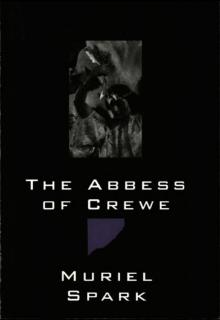 The Abbess of Crewe: A Modern Morality Tale
The Abbess of Crewe: A Modern Morality Tale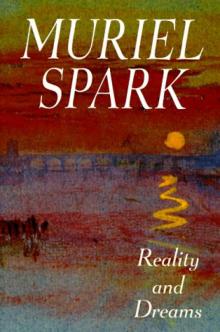 Reality and Dreams
Reality and Dreams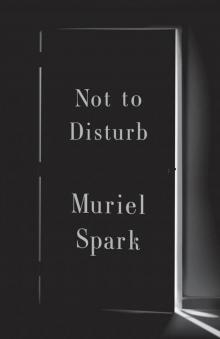 Not to Disturb
Not to Disturb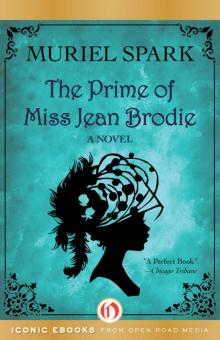 The Prime of Miss Jean Brodie
The Prime of Miss Jean Brodie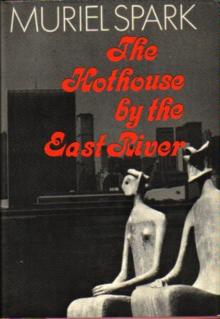 The Hothouse by the East River
The Hothouse by the East River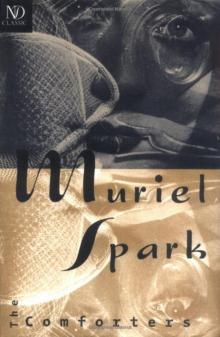 The Comforters
The Comforters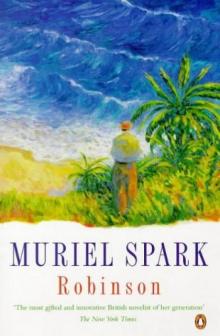 (1958) Robinson
(1958) Robinson Unknown
Unknown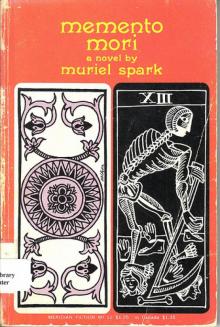 Memento Mori
Memento Mori The Finishing School
The Finishing School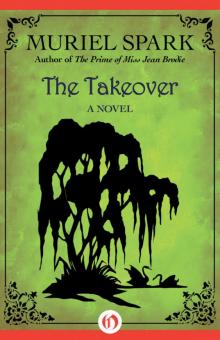 The Takeover
The Takeover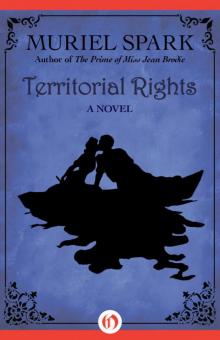 Territorial Rights
Territorial Rights The Complete Short Stories
The Complete Short Stories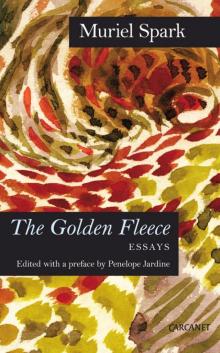 The Golden Fleece: Essays
The Golden Fleece: Essays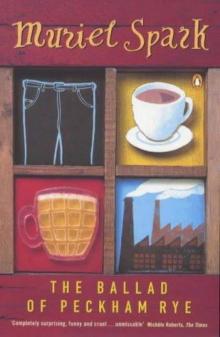 The Ballad of Peckham Rye
The Ballad of Peckham Rye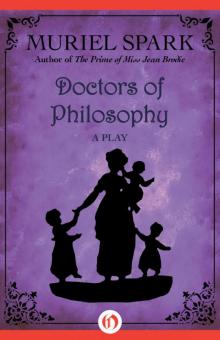 Doctors of Philosophy: A Play
Doctors of Philosophy: A Play The Mandelbaum Gate
The Mandelbaum Gate Loitering With Intent
Loitering With Intent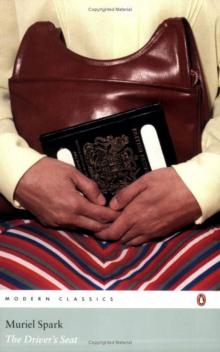 The Driver's Seat
The Driver's Seat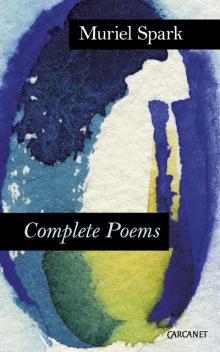 Complete Poems: Muriel Spark
Complete Poems: Muriel Spark Symposium
Symposium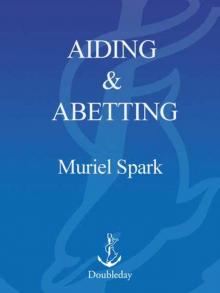 Aiding and Abetting
Aiding and Abetting The Golden Fleece
The Golden Fleece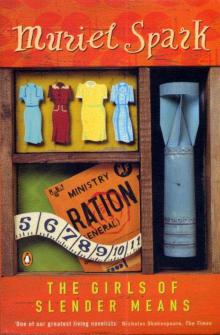 The Girls of Slender Means
The Girls of Slender Means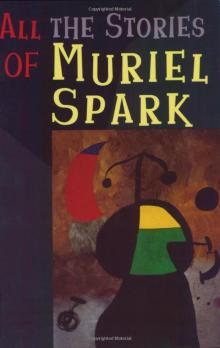 Alice Long’s Dachshunds
Alice Long’s Dachshunds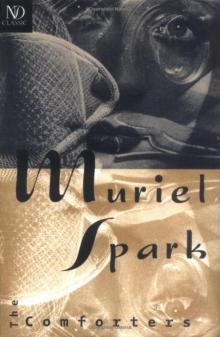 (1954) The Comforters
(1954) The Comforters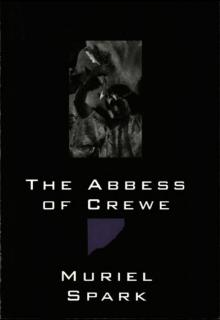 The Abbess of Crewe
The Abbess of Crewe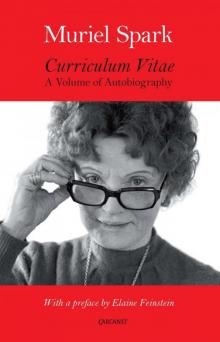 Curriculum Vitae
Curriculum Vitae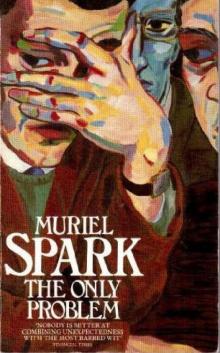 The Only Problem
The Only Problem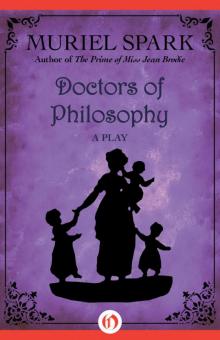 Doctors of Philosophy
Doctors of Philosophy